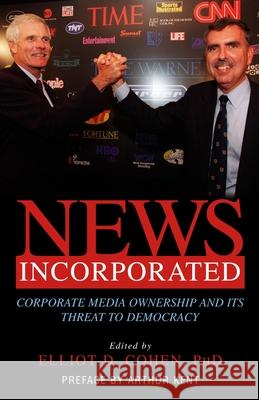News Incorporated » książka
News Incorporated
ISBN-13: 9781591022329 / Angielski / Twarda / 2005 / 322 str.
The current climate of American journalism is fraught with incestuous relations between government and a handful of Fortune 500 corporations that own and operate news organizations. From News Corporation's Fox News, General Electric's NBC, Viacom's CBS, Disney's ABC, and Time Warner's CNN to Clear Channel's massive radio empire, what the mainstream media present as "news" has become largely a "paid political announcement" born of favor trading, conflict of interest, and self-serving, bottom-line corporate logic. As a result of such accommodationism, American viewers receive a homogenized, censored version of reality and the watchdog of American democracy, the press, has become a docile instrument of governmental authority and big money.
In this timely collection of essays by more than a dozen of the nation's top media scholars, critics, and journalists, including a preface by Arthur Kent, the present media crisis is carefully exposed. From coverage of the war in Iraq to national security, this book details the manner in which journalists have walked in lockstep to the self-serving quid pro quo of government and corporate media giants. Among the many topics broached are methods of media manipulation and propagandizing; the claim that the media is liberal; media ownership, rules, and deregulation; alternative media; the threat to free access to information on the Internet; the effects of media consolidation on actors, producers, agents, managers, and lawyers in the film industry; and the standardization of music and reduction of localism in radio. The contributors include media critic Danny Schechter, political analyst Michael Parenti, Mother Jones publisher Jay Harris, the ACLU's Barry Steinhardt and Jay Stanley, former FCC Chairman Reed Hundt, and many other distinguished commentators. Not only does this book expose the current crisis, it proposes solutions to it, pinpointing legal and constitutional challenges, reviewing recent FCC rulings and congressional legislation, and proposing structural changes in the ways diverse media currently operate. For any American who prizes democracy, this book is a clear wake-up call to look more carefully behind the superficial slogans of a free America and the stars and stripes strategically displayed on the TV monitor.










